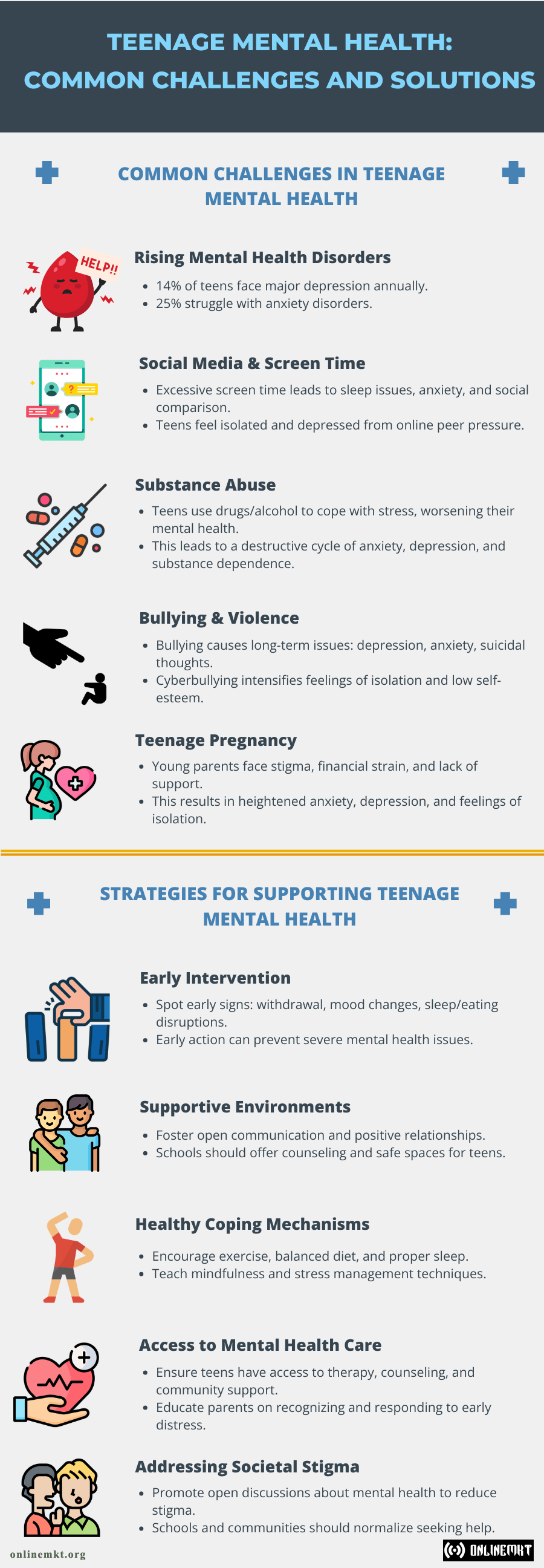Teenage Mental Health: Common Challenges and Solutions

The mental health crisis among teenagers is a ticking time bomb, threatening their futures and the stability of our society.
Teen mental health is an emerging challenge to community. Teens today face a number of challenges that can significantly impact their psychological and emotional state of mind. It is important to know these issues and the most appropriate solutions to them in order to assist youths during this stage of life.
Common Challenges in Teenage Mental Health
Rising Rates of Mental Health Problems
Current statistics demonstrate a rise in mental illness among adolescents. An estimated 14% of adolescents experience a major depressive incident every year, and about 25% experience anxiety disorders. The Centers for Disease Control and Prevention (CDC) indicate that almost three out of four adolescents between 12-17 years frequently experience depression or anxiety. This is a significant increase compared to previous generations. These rising rates are indicative of the need for more awareness, understanding, and support of the mental health of young people.
Social Media and Screen Time
The influence of social media and screen time has become one of the critical challenges to teenage mental health. The majority of teenagers spend hours online, typically with negative consequences. These can vary from sleep disturbance, lack of physical activity, to enhanced anxiety due to social pressures. The continual exposure to manipulated images and activities on social media can lead to hazardous comparisons, which leave teenagers feeling inadequate, lonely, or deserted. For example, seeing peers post social events they were not included in may lead an adolescent to feel rejected and lonely, triggering feelings of worthlessness and depression.
Substance Abuse
Another severe issue among youths is substance abuse. The majority of youths turn to alcohol and drugs as a way of coping with stress, depression, or anxiety. The vice causes cognitive impairment and emotional instability, typically forming a vicious cycle where mental problems lead to substance abuse, which further exacerbates the original issues. For instance, a teenager might start using alcohol to alleviate anxiety, only to find that it depresses their mood and enhances anxiety in the long run.
Bullying and Violence
Bullying, both face-to-face and via the internet, remains a significant threat to the emotional safety of youngsters. Violent incidents – physical, verbal, or emotional – can have lasting impacts. Victims of bullying oftentimes feel isolated, humiliated, and helpless, leading to chronic psychological issues like depression, anxiety, and even suicidal behaviors. For example, an adolescent who is consistently bullied at school might start to fear going to school, develop low self-confidence, and withdraw from friends and family.
Teenage Pregnancy
Teenage pregnancy is a specialized set of challenges that can affect physical and mental health. Teen parents may undergo social stigmatization, financial adversity, and lack of emotional support, all of which add up to increasing anxiety and depression. Teen parents may feel frustrated with childcare responsibilities, and this can lead to feelings of isolation and despair. It is necessary to have a healthy support system available to assist young parents during these challenges and promote their mental well-being.
Solutions and Support Strategies
Early Intervention
Detection of the early signs of mental health issues is critical. Parents, caregivers, and teachers need to be attentive for change in behavior, such as withdrawal from social activities, change in sleeping or eating habits, or sudden mood swings. Early intervention allows for early support, which can deter the development of more severe mental health problems. For example, if a teenager begins to show signs of depression, such as ongoing sadness or irritability, an early appointment with a healthcare provider can lead to a more favorable outcome.
Building Supportive Environments
Creating a warm and caring home and school environment is essential for developing good mental health. Encouraging open communication, fostering good relationships, and facilitating access to mental health services can go a long way. If adolescents feel listened to and supported, they are more likely to speak up about their difficulties and receive assistance. Schools can lead the way by offering counseling services, mental health education, and safe spaces where students feel comfortable expressing themselves without judgment.
Promoting Healthy Coping Mechanisms
It is critical to educate teens on healthy ways of coping with stress and emotions. Encouraging physical activity, healthy eating, and adequate sleep is crucial to good mental health. Mindfulness, deep breathing, and relaxation can be employed to manage stress and anxiety. For example, teaching an adolescent to utilize mindfulness meditation can provide them with a tool to calm the mind, stay in the moment, and reduce feelings of anxiety.
Access to Mental Health Care
It is essential to provide teenagers with access to quality mental healthcare. This includes professional treatment services like counseling and therapy, as well as support from community services, friends, and family. Mental health interventions that teach parents and caregivers about adolescent mental health can empower them to provide better support and recognize early warning signs of distress. For instance, schools can collaborate with mental health experts to organize workshops for parents on how to promote their children’s mental health.
Addressing Societal Stigma
Reducing the stigma surrounding mental health is crucial in motivating teens to seek help. Open discussions about mental health in schools, families, and communities can promote a culture of acceptance and understanding. Normalizing the mental health discourse can help teens feel less alone and more open to seeking help. For example, a school mental health awareness campaign that also lets students know where they can find help can go a long way in creating a supportive and inclusive environment.
Conclusion
Teen mental health is influenced by a complex set of factors, from societal pressures and home life to individual circumstances. To address these challenges, a harmonized approach to early intervention, supportive environments, and easily accessible mental health services is required. By prioritizing the mental health of teenagers, we can help them navigate this critical period of their lives more successfully, laying the foundation for a brighter, more fulfilling tomorrow.